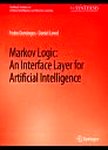版权所有:内蒙古大学图书馆 技术提供:维普资讯• 智图
内蒙古自治区呼和浩特市赛罕区大学西街235号 邮编: 010021

丛 书 名:Synthesis Lectures on Artificial Intelligence and Machine Learning
版本说明:1
I S B N:(纸本) 9783031004216
出 版 社:Springer Cham
出 版 年:1000年
页 数:IX, 145页
主 题 词:Artificial Intelligence Machine Learning Mathematical Models of Cognitive Processes and Neural Networks
摘 要:Most subfields of computer science have an interface layer via which applications communicate with the infrastructure, and this is key to their success (e.g., the Internet in networking, the relational model in databases, etc.). So far this interface layer has been missing in AI. First-order logic and probabilistic graphical models each have some of the necessary features, but a viable interface layer requires combining both. Markov logic is a powerful new language that accomplishes this by attaching weights to first-order formulas and treating them as templates for features of Markov random fields. Most statistical models in wide use are special cases of Markov logic, and first-order logic is its infinite-weight limit. Inference algorithms for Markov logic combine ideas from satisfiability, Markov chain Monte Carlo, belief propagation, and resolution. Learning algorithms make use of conditional likelihood, convex optimization, and inductive logic programming. Markov logic has been successfully applied to problems in information extraction and integration, natural language processing, robot mapping, social networks, computational biology, and others, and is the basis of the open-source Alchemy system. Table of Contents: Introduction / Markov Logic / Inference / Learning / Extensions / Applications / Conclusion